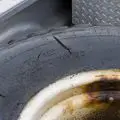Hey! This site is reader-supported and we earn commissions if you purchase products from retailers after clicking on a link from our site.
When you’re living full-time in your RV, the last thing you might think about is your tires. However, they are an essential piece of your RV when it comes to your vehicle’s safety and longevity. However, with the recent surge of people living on the road and increased popularity of RVs, more and more brands are marketing “the best tires” for full-time RVers. How do you know which ones are really the best?
I have meticulously compared what makes the best RV tires and have chosen 5 of my favorites for anyone living full time in their RV.
Keep Rolling With These RV Tires
| Best RV Tires | Best For: |
| Goodyear Unisteel G614 | Overall Value |
| Goodyear Wrangler Silent Armor RV Tire | Quietest |
| Michelin EXP Rib | Durability |
| Gladiator Steel Belted | Affordable |
| Bridgestone Duravis | Off-Road |
Our Reviews
Below are our reviews of the 5 best RV tires, including pros and cons for each of our choices.
Best Overall
Goodyear Unisteel G614
Goodyear offers top of the line tires for all vehicles and is one of my favorite brands for RV tires. The Unisteel G614 RV tire offers even treadwear with solid rounded shoulder ribs, which also improves stability and handling. These tires are optimal for both wet and dry roads, and Goodyear has added a specially designed tread pattern for exceptional traction.
My favorite aspect of these tires is the shallow tread pattern, which actually reduces heat buildup and helps the tires last longer. The Unisteel G614 tire also has a maximum weight capacity of 3750 pounds, so you know it will hold up to just about anything you put it through!
- Package Weight: 57.5 pounds
- Package Height: 9.3"
- Package Length: 31.8"
Last update on 2025-08-22 / Affiliate links / Images from Amazon Product Advertising API
Pros:
- All-weather tires
- Shallow tread pattern reduces heat buildup
- Solid rounded shoulder ribs
- Superior handling on wet and dry roads
- Commercial grade strength and dependability
- Good for 5th wheel toy haulers
Cons:
- Tread may wear faster on gravel roads
- Low-speed rating
Quietest RV Tires
Goodyear Wrangler Silent Armor RV Tires
Goodyear’s Wrangler Silent Armor RV tires are perfect for both dirt roads and highways! These tires have a DuPont Kevlar outer layer, adding to their traction and durability while also offering the quietest ride on highway roads. The tread design has exceptional grip on wet, muddy, or dry roads, and the open tread helps to absorb sound while you’re traveling down the highway.
Not only does the quiet ride make these tires perfect for full-time RVers, but they are also rated as all-terrain, all-season tires. You can be confident that they will offer exceptional handling, traction, and durability, no matter where your adventure takes you.
Pros:
- DuPont Kevlar layer adds durability and absorbs sound
- Cut and puncture resistant sidewalls
- Exceptional Off-Road traction
- All-Season, All-Terrain tires
Cons:
- Much pricier than other options
- Open tread design can create slightly spongy handling
Most Durable RV Tires
Michelin EXP Rib
It’s no surprise that the most durable tire would be Michelin’s EXP Rib commercial truck tires. Michelin has developed these tires specifically for light commercial trucks, ensuring that they hold up to continuous use with heavy loads. My favorite piece of these tires is the addition of steel casing, which adds strength and allows for retreading.
Additionally, these tires include a built-in sidewall protector, adding resistance and strength to the sidewall. The added steel casing and sidewall reinforcement give the tires a higher load weight, so they can handle all of your gear and equipment while providing superior traction on all types of roads.
Last update on 2025-08-22 / Affiliate links / Images from Amazon Product Advertising API
Pros:
- Reinforced with steel casing
- Allow for retreading
- Superior fuel economy
- Designed for commercial level durability
Cons:
- Average handling in wet and snowy weather
- Higher cost
Best Value
Gladiator Steel Belted
Like the Michelin EXP Rib, the Gladiator Steel Belted tires are built with reinforced steel belting to add to the tires’ strength and durability. With the additional reinforcement and high traction tread, these trailer tires are an excellent option for anyone with an RV trailer on a budget.
Gladiator’s tires are rated for highway speeds and have all-weather traction capabilities for easy handling on wet, wintery roads. However, these trailer tires have a lower load rating, so they are more suitable for smaller RVs and campers.
Pros:
- Affordable
- Steel belted
- High durability
- Rated for highway speeds
- Good trailer tire
Cons:
- Lower weight rating
- Not suitable for large RVs
Best Off-Road RV Tires
Bridgestone Duravis
Bridgestone offers a great tire with a dynamic treading design in the Duravis model. These tires have a unique tread pattern and reinforced ribbing to improve traction and add strength to the sidewall. In particular, the ribbing helps make these tires resistant to curbing, cuts, and abrasions, which is why it’s my favorite for off-road RV travel.
When looking for that perfect spot to park your RV, you might need to take dirt roads, or go off-road completely, in which case you will likely encounter holes, rocks, stumps, and just about anything that can strain your tires. The improved dry and wet traction of these tires will help you handle anything the roads might throw at you, while the increased casing durability will help you get to your destination safely without needing to worry about a flat tire on the way.
- Tbr Compounds Contribute To High Casing Durability.
- Closed Shoulder Slots Contribute To Increased Wear Life.
- Stone Ejector Helps Protect Against Stone Drilling To Protect Belts And Enhance Casing Durability.
Last update on 2025-08-22 / Affiliate links / Images from Amazon Product Advertising API
Pros:
- All-Terrain, highway speed rated
- Exceptional wet and dry traction
- Curbing, cut, and abrasion-resistant
- Dual sidewall protector ribs
Cons:
- Looser handling in heavy snow
- No rim protection
Recap: The Best RV Tires
- Goodyear Unisteel G614 – Overall Value
- Goodyear Wrangler Silent Armor RV Tire – Quietest RV Tire
- Michelin EXP Rib – Durability
- Gladiator Steel Belted – Affordable
- Bridgestone Duravis – Off-Road
What to Consider When Buying New Tires For Your RV
No RV is exactly the same, which means that you won’t be able to put the same tires on every RV. When selecting the best tires for your rig, it’s important to consult your maintenance and repair manual to understand your vehicle’s specific tire needs. Then, consider everything you’re going to put your RV through, such as load weight, speed, and weather, to identify the tires that will work best for you.
Sizing
The sizing of your tire is vital to get right to keep yourself and others on the road safe. A tire that is too small won’t have the proper rating for your size RV and could blow easily, whereas a tire that is too big could invade too much into the wheel well and cause extra wear and tear on other wheel components.
Look in your maintenance manual for the tire sizing guide to identify what class of tires you need, as well as the specific measurement range. Typically, you will see RV tires rated for class A, B, and C RVs.
Class A will be for large RVs and motorhomes, which will put significantly more weight on your wheels and tires. Class B is for the smallest RV options, including lightweight motor homes and sprinter vans, and Class C is designed for the middle ground between large and small RVs.
Sidewall Strength
It is also essential to understand the difference between different types of tires available for RVs, as they will offer different sidewall strength. The sidewall strength will directly affect your tires’ longevity when living full time in your RV, so it is worth it to spend a little more on stronger tires.
Two of the most common types of tires available for RVs are specific RV tires and light commercial truck tires. Unlike RV tires, light truck tires have stronger sidewalls and are designed for heavier commercial loads. They can withstand much more wear, which will help them last longer when you’re driving year-round. They also handle better than traditional RV tires, so they are perfect for the wide range of road conditions you are likely to encounter.
Rating
The tire’s rating is ultimately what will help you identify the ideal tire for your unique situation. Different types of tires are rated for different speeds and load weights. Think about where you will be driving and how heavy your rig is with all of your equipment and belongings loaded up before selecting your tires.
Weight
According to the RV Safety & Education Foundation, most RVs are run at a significantly higher weight than what their tires are meant to handle. The high weight is typically due to RVers forgetting to add in all of their gear and belongings onto the vehicle’s weight.
When looking at weight ratings for your tires, it’s always a good idea to go for something that can handle more weight than you estimate your rig to be. This way, you will have some wiggle room when it comes to the belongings you can keep in your RV while still keeping you safe on the road.
Speed
Additionally, the roads that you will most often be driving on will dictate your tires’ speed rating. If you tend to stick to the scenic back roads, you can opt for a lower speed rating to save you a little money. However, if you will be driving on highways and faster speed roads, get yourself a set of high speed rated tires so you can be sure they will last and you won’t accidentally shred them by going too fast.
Weather
Finally, full-time RVers need to consider the weather of the area you’ll be in when selecting tires. When you’re living on the road and traveling across the country, you could run into everything from dry gravel to snowy and wet roads in a matter of days. Make sure you have tires that will be adaptive to the constantly changing road conditions.
Generally, it is safe to choose all-weather tires, which are rated for dry, wet, and snowy conditions. Car and Driver states that these will have tread patterns and additional grip features explicitly designed to maintain easy handling of your RV no matter what type of weather you will face. All-weather tires can run on the more expensive side, but this way, you will be good to go no matter the weather you run into.
To understand your RV tires better, make sure to read Brian’s guide on everything you need to know about your RV tires and the articles below.
Keep the Adventure Going!
Living on the road has its own set of obstacles, mainly because your rig is your home. That is why it’s vital to keep your RV running efficiently and safely with a set of tires that will meet your unique needs no matter what adventure awaits!
Frequently Asked Questions
How Long Should RV Tires Last?
RV tires should last anywhere from 3 to 6 years depending on how often you use your RV. It is always best to check the tread depth of your tires every year or so to make sure that they are wearing evenly and the tread is still in good shape. You should always check for cracks and bubbles in your tires before putting your RV on the road for long distances. Read Brian’s full column on how long do RV tires last for more.
How Much Do RV Tires Cost?
This varies greatly based on the size of your RV. Our article will be able to give you a better idea of what size tires are best for your RV and their prices. When you take your RV to a shop to have the tires replaced, always check the price of the tires before you buy, there could be a cheaper option out there.
Should RV Tires Be Rotated?
Yes, you should rotate your RV tires every 6000-8000 miles to help improve their lifespan and to ensure that they are wearing evenly. Rotating your tires can be done at home if your RV has jacks, or can be done inexpensively at a dealer or mechanic when you take your RV in for routine maintenance.








